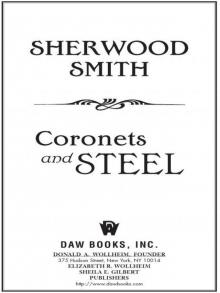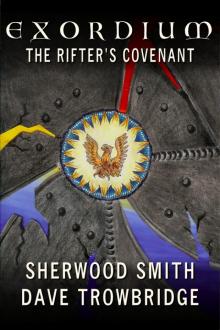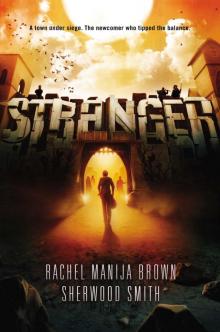- Home
- Sherwood Smith
Commando Bats Page 2
Commando Bats Read online
Page 2
I knew a whole bunch of fellow wheelers who would give me a big thumbs up on that one.
I began the turn when a familiar cheery caw caught me: “Nancy!”
It was my neighbor, Twila Dewey.
“Where you going like a house on fire?”
Twila was ninety-two, and lived in the apartment over the garage next-door. She often sat out on her balcony, and though she didn’t seem to have a cell-phone, judging by the loud ring from her place, she didn’t need one. She ought to be at the NSA giving them lessons on espionage, Kenneth had said once.
“Plumbing,” I lied.
“Stay on it,” Twila advised. “Though I will say for those two fellas, no slouches as landlords. Which is more than I can say for Mr. Mingus across the street. Did you know he raised the rent on the Tolberts again, just because they got a kitten? Two hundred simoleons for a kitten! Imagine! Wonder what he’d charge if they got a horse?” She cackled at her own wit.
The “ding” went off on the microwave. Saved by the bell! “My food. Bye, Twila!” I called as I retreated.
Her cracked voice followed me. “Remember your PT, Nancy. You’ll be walking in no time, just don’t slack off!”
I shut my door, and sat down to eat. Before I finished, my cell rang.
There was Bettina’s alto voice, her precise consonants. “Is this Nancy? We’ve got to talk.”
~~~
We met at a coffee shop on PCH, as I don’t have a car. I got there first, not having to deal with traffic or parking, which meant they didn’t have to stand around awkwardly while I wrestled myself from my half-charged scooter to walker to booth.
They arrived about thirty seconds apart. Bettina took over with the brisk assurance of a veteran high school teacher — which it turned out she was. Thirty-five years. She’d clearly decided to make the best of this situation as she greeted us by name, told us the above, then asked what we both do.
“Artist,” I said, leaving out the verb “was.”
That got a flicker of interest from Cecile, until Bettina asked what medium, and if my work was on display anywhere. “On the science fiction and fantasy shelves of bookstores” got a noncommittal expression from Bettina, and from Cecile the faint, wrinkled upper lip of the grand lady picking a dead spider out of her foie gras terrine périgourdine.
Bettina turned to Cecile.
“I never worked,” she said, that goose-egg of a diamond flashing on her left hand.
By then I pretty much hated her, sitting there so poised in her eight hundred dollar haircut, even more expensive clothes and matching bag and shoes.
I bet she votes Republican, I thought with totally non-bigoted charity, when Bettina said, “So what did you two do when you got home? As near as I can figure, what I do is a plasma channel,” and seeing incomprehension in Cecile and me, “where lightning and lasers intersect. I shorted out every circuit in my house. In fact, I am pretty sure I took down the entire block, and that was after I burned a hole through my kitchen wall, cutting a chunk from the oak tree out front. My husband’s in Israel on a dig, which is good. But I’m going to have to tell him something.”
“I think I can fix it,” I said. “Not the tree. The juice.”
My words slur. I sound drunk. People tend to look away when I speak, so having two pairs of eyes skewer me caused my head to turtle into my shoulders. I added wimpily, “I think.”
I explained in two sentences about my first experiments, then, “On my way here. Waiting at a corner for a red. Touched the traffic light pole. Schematic, local power grid. Found four burned out traffic lights. Fixed ’em. At least, I think so. Didn’t actually see them.” I hadn’t talked so much in weeks. My lips and jaw felt overworked.
Bettina said to Cecile, “So what did you learn? Or did you try anything?”
Cecile’s perfectly lip-sticked mouth contracted again, and I thought she was going to ignore Bettina altogether, when a cheerful young guy with a shock of red hair bounced up. “May I take your order?”
We all ordered something we didn’t want — lemonade for me, with a straw — and when he went away, Cecile glanced from Bettina, who was still waiting, to me, to the big window looking out at the nighttime traffic, then she said, “I destroyed my condominium.”
“What?”
“What?”
Cecile gave a shifty look at the other tables, whose occupants clearly felt no interest whatsoever in three old women. After a long pause, the wait-person reappeared with all our various liquids.
When he was gone, Cecile seemed to come to a decision. She squared her elegant shoulders and said, “I am a walking cliché. Today my husband of forty-two years informed me that he is feeling old and stale, and he needs a fresh start.”
Bettina sat back, and all my annoyance zapped away, leaving a pool of guilt sloshing inside me with the unwanted lemonade as Cecile said, “What he meant was that I’m the old and stale part of his life. It seems he has fallen in love.” She made air quotes. “He wouldn’t tell me her age, but made a lot of promises about how he would take care of me — I would get my half of everything — how much he appreciated my support and. . . .” Her voice went husky and uneven. She caught herself up, and her smile turned bitter. “When I tell you that he is bald, fat, and looks his age — four years older than I am — then I feel I am justified in wondering if this May and December romance is really May and Money. Our money.”
She picked up her coffee spoon, poured in a delicate dollop of soy milk, and stirred the spoon around and around as she said, “I guess I should have seen it coming. I wondered why he bought a sports car, when he would never let our sons drive it. Went on a diet, for the first time in his life. Stopped going to church — he had more cases to review — he said he was at the courthouse — and all those late nights.” She paused, then burst out, “I can just see her twining his tie around her finger like some Fanny Dashwood in Prada, and I will end up with nothing.”
She paused, as if she didn’t expect the black woman and the half-zombified geek to understand the Jane Austen reference (or maybe it was Prada?), and I got annoyed with her all over again.
Bettina said dryly, “I’ve been teaching Sense and Sensibility to high school honors students for thirty years.”
“And I’ve seen the movies,” I said. “That includes the one about Prada.”
Cecile gave me a funny look, and I felt a pulse of guilt for my leaden irony, then she whirled that spoon faster in the cup, scrape, scrape, scrape. “We married the week I graduated from USC. I’ve never had a job. If he takes everything to give it to her . . .” Scrape, scrape, scrape. Then she said so low I almost didn’t hear her, “I don’t know what to do.”
“First thing you do, girl,” Bettina stated, “is get your own lawyer. Do not let him sweet-talk you into using one of his friends.”
Cecile looked startled. “I —” She reddened. “Jack Pennington is an old family friend. We and the Penningtons are godparents to each others’ children, and attended all their weddings. Ralph suggested I use him, and I thought, at least he’d keep it discreet . . .” She trailed off as Bettina rolled her eyes. “What?” Cecile asked, looking wary, her tone affronted.
“If everybody in your world isn’t already gossiping, then I will eat that spoon you keep swishing around. The wife is always the last to know.”
I stuck my oar in. “Fanny doesn’t get you, the good old boys will.”
Bettina said, “So tomorrow you call a shark. A female shark.”
Cecile looked up into space. I could practically see her rapidly re-evaluating all the lawyers in her world of law and politics. Sure enough, her lips thinned. “There is one he really, really hates — a liberal feminist —”
“That’s the first one you call.”
Cecile dipped her chin in that ladylike nod again, then she said without the cultured drawl, “Back in 1973, a Sociology degree was what we all did in our sorority. Then we married right after graduation, and my parents bought us our first
house, out in Sierra Madre. Entertaining was so important back then, when he was a junior partner . . . well, in any case, I have spent my entire life fighting getting old. We adopted so I wouldn’t ruin my figure, I had my first facelift at forty-two. Is that wise?” Her voice was really bitter on that last word as she stared down into her cooling coffee. “After he did that, I couldn’t think. Just left our place and started walking.”
Walking to the pier? I had a feeling ‘our place’ was a four thousand square foot condo on Ocean Front.
“Then that woman did what she did, and I went home, and . . . what I did wasn’t wise. But it felt great.”
What she did? Uh oh, I thought. Here it comes.
I slipped my tablet out of my bag and put it in my lap. Experimentally, I focused, and there was its schematic.
Cecile stopped stirring the coffee, tapped the spoon with delicacy on the side of the cup, and said in a stronger voice, “He was gone, so I went into our bedroom and yanked open the doors to his closet. I guess I wanted to see if he had any of her things, though he is the adulterer. The doors ripped off the hinges. I threw one of them at the floor to ceiling mirror in his bathroom . . . and, well . . .” She took a deep, shuddering breath. “It just felt so good when it broke into a million pieces. So I smashed everything of his, and threw all his furniture over the balcony onto our private beach. His furniture, his precious suits from London, everything.”
(I knew it, Ocean Front Walk, I grumped to myself.)
On the tablet, my search turned up a row of entries on Hephaestus.
Cecile went on. “I was starting on his study when you called. He should be getting home soon. I’m afraid he’ll have me arrested, or committed. Or if that Hera woman is real, she’ll come around and turn me into a tree, or whatever they do.” She put her hands over her face. “Maybe all this is hallucination and I have a brain tumor.”
Swell, Hephaestus was crippled. Joke’s on me, Hera!
I looked up, finding Cecile staring at me. “Tell the hubs it was a break-in,” I said, trying to sound friendly and helpful. “Gang hoodlums.”
I could see them both contemplating the likelihood of a bunch of hulking young guys in tats and hoodies driving unnoticed up Ocean Front, which has enough private security to run the secret police of a small country, just to break in and trash an old guy’s New England wing chairs and Gieves & Hawkes suits.
“Or not,” I said.
Bettina shrugged. “He probably won’t believe that you could do it. But if that Hera was serious, you’re right, we’ve got a bigger problem. How do you think we look to Them so far?”
I could hear the capital T, and after all, if we could be given superpowers, we could be watched by all the gods.
It was then that I got to Hephaestus’s attributes. Blacksmith . . . metal worker . . . Inventor, Holy Crom! Metal automatons? Hephaestus had robots as his minions!
Cecile’s expression had reverted to the remote hauteur we first saw. That’s how she looks when she’s scared. “I want to give it back,” she whispered.
“Doesn’t look like that’s an option.” Bettina set her coffee cup down. “So here we are. Either we go our separate ways, in which case, good luck. Or we deal with this together. She did put us together.”
Cecile said, “She picked out three people our age who happened to be standing at the end of the pier.”
“Cosmic joke,” I said.
They both ignored me. Bettina said to Cecile, “You don’t think she couldn’t have separated us out if she wanted to?”
I couldn’t get my mind off those robots. I felt the art itch, for the first time since the stroke that poleaxed me while standing in line at the post office. “Going home,” I said, beginning the exasperating struggle to shift myself from bench to walker to scooter. “Experiment.” To Bettina, “You want me to fix your house, call. Morning.” In addition to everything else, I was talked out.
I put down my share of the bill, and exited.
On my way home, I touched every pole, wall, fence, and other kind of structure that might have electricity. I discovered that I had to have some kind of metal under my fingers to get a schematic, but it didn’t have to be much. A few electrons through my fingers could find their way in picoseconds past shielding — the world is filled with EM. And the larger the power source, the better schematics I could command.
Living on social security means being very careful with money. I stopped at a 99c store to pick up some cheap toys to experiment with, ones that contained at least a bit of conducting metal.
When I reached the gate at home, the motion detectors put on the lights. As I rolled into the yard, which was warm and still and full of the scent of jasmine, Twila Dewey’s voice startled me.
“Nancy, what you doing out so late? Got a fella at last?”
“Hobby shop. Supplies,” I called, holding up my bag of toys.
“Good for you! You just keep at it, you’ll be drawing unicorns again in no time!”
Unicorns? I’d never been in Twila’s place, nor she in mine. How did she know what I drew? I shook my head as I rolled in and shut my door firmly. The NSA could save a bundle on cyberspy equipment just by hiring her.
Since I couldn’t build robots, I’d hoped that toys would suffice, and I was right. Toys could be my minions, interfaces between my hand and other sources of electricity, as long as I was careful not to break or burn out the flimsy toys with too much juice.
I crash-landed into bed.
It felt like I’d just fallen asleep when my phone went off beside my ear. It was Bettina, who said she’d taken a personal day from school, and wanted to know if I was good for my promise — if so, she’d be right over to pick me up, as the city hadn’t been able to restore power to their block.
She lived a couple miles inland in West L.A., on a pleasant block full of jacaranda trees, currently in brilliant lavender bloom.
There on the front lawn was a sturdy California oak, a shocking hole in one side, like a bite from some kind of energy dragon.
“My nephew works for a contractor,” she said when she took me into her living room, which like mine, had wall to ceiling bookcases. Scorch marks scored the ceiling, and there was a hole in the wall between living room and kitchen, a perfect circle about the size of a baseball, with burn marks around the edge. “The damage to the house, I can get fixed. I hope the tree survives.”
She took me through to a typical back yard except for some bricks piled up beside the cement-block wall. These were covered with various types of laser burns. A bunch of red fragments lay scattered, obvious remnants of explosions.
Bettina said, “I’m getting there.”
I’d told her a little about my robot minions on the drive over, and she’d admitted she was also experimenting. She held up one hand, fingers poised as if she held something invisible against the length of her forefinger. “Harry Potter was my model,” she admitted.
“Wand!” I exclaimed.
“A knitting needle. At first I actually used one of my metal number 4s, but it got hot. Now I know the feel of it in my hand, so I see it there, and aim.”
She pointed her hand as if she held a wand. A thin beam sizzled across the yard, and punched into a brick.
“That’s got to be fun,” I exclaimed and for the first time, she smiled a little.
Then she indicated the back wall. “Here’s the fuse box.”
I carefully placed my hand on the metal plate, and shut my eyes. There was my schematic of the house, the underground cables, and then the local power grid.
This was my first really big challenge. The schematic took over my entire brain. For a time it felt like I’d fallen into it, and I couldn’t find my way out. But when I made the mental shift to seeing myself inside, rather than outside — racing along with the electrons — well, the nearest comparison I can think of it playing a 3-D video game, only I was driving with my brain instead of my fingers on a joystick.
I stayed there refusing burned lines
and straightening snarls until the whole was clean and crisp again, humming like a hive of a million contented bees.
I flexed, and felt the entire block light up.
Getting back to myself was tougher, a little like pulling out of a wallow of sucking mud. But I made the shift . . . and found Bettina hovering anxiously over me, as a faint “Finally!” reached us from one of the neighboring houses.
Bettina smiled with relief. “I was debating whether I ought to call 911.” And at my no-doubt puzzled look, “You have been sitting there for almost three hours. I held off only because I could see your eyes moving.”
“Tired,” I admitted.
“I’ll get you right home.” With a thoughtful look, as she began to pace beside me, she said, “What did you take away from our discussion last night?”
“Robot minions. You?”
“Until about five minutes ago, I thought someone was setting us up to fail.”
“Because we’re old?” I asked.
“Maybe. It was more that of the three of us, two were given powers of destruction, and yours was in question until now. Then there was whom she picked.”
“Cripple?” I held up my left hand.
Bettina’s eyelids flickered, which made me wonder if I’d come close, but she said, “Cecile Schuyler has bigger problems on her mind than trying to be Hercules. And I put in a sixty-hour work week during the school year, so even if we wanted to, who’s got the time to run around the city playing superhero, if that’s what Hera wants?”
“Athena said to be different.”
Bettina opened the gate. “Different,” she repeated. “I don’t know what to expect, outside of my hope of waking up to discover it was a bad dream.” She reached up to touch a low branch of the oak with the laser hole burned into it. “Are Titans going to come stomping through Los Angeles, and we are to battle them?”
“Can’t fight cyclops and minotaurs with electricity,” I said — my lips getting a real workout on cyclops and minotaurs.

 Inda
Inda Danse De La Folie
Danse De La Folie King's Shield
King's Shield Whispered Magics
Whispered Magics Fleeing Peace
Fleeing Peace Barefoot Pirate
Barefoot Pirate Crown Duel
Crown Duel Mearsies Heili Bounces Back
Mearsies Heili Bounces Back Commando Bats
Commando Bats A Stranger to Command
A Stranger to Command Lhind the Spy
Lhind the Spy The Spy Princess
The Spy Princess Blood Spirits
Blood Spirits Sasharia en Garde
Sasharia en Garde Lhind the Thief
Lhind the Thief Paradise Drift
Paradise Drift Banner of the Damned
Banner of the Damned The Trouble With Kings
The Trouble With Kings Poor World
Poor World Treason's Shore
Treason's Shore Wren Journeymage
Wren Journeymage A Posse of Princesses
A Posse of Princesses Revenant Eve
Revenant Eve Once a Princess
Once a Princess Time of Daughters I
Time of Daughters I Rondo Allegro
Rondo Allegro Coronets and Steel
Coronets and Steel Over the Sea
Over the Sea Senrid
Senrid Hunt Across Worlds
Hunt Across Worlds A Sword Named Truth
A Sword Named Truth The Fox
The Fox Twice a Prince
Twice a Prince Fair Winds and Homeward Sail: Sophy Croft's Story
Fair Winds and Homeward Sail: Sophy Croft's Story Time of Daughters II
Time of Daughters II The Rifter's Covenant
The Rifter's Covenant The Phoenix in Flight
The Phoenix in Flight Stranger
Stranger The Thrones of Kronos
The Thrones of Kronos A Prison Unsought
A Prison Unsought Twice a Prince: Sasharia En Garde Book 2
Twice a Prince: Sasharia En Garde Book 2